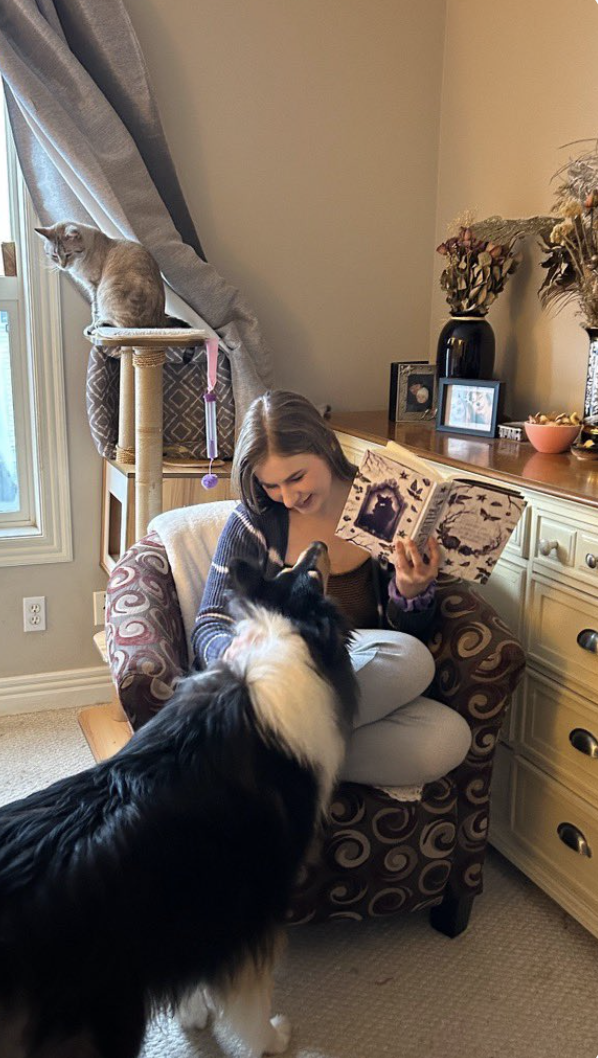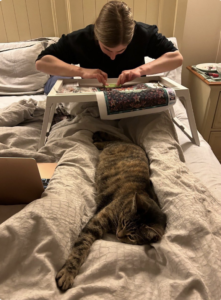There are many things that Ophelia Black, 22, would like to do. Going back to school, building a career and falling in love are high on the list. But right now, her life is dominated by a fight for continued access to the hydromorphone (Dilaudid) she’s been prescribed for the past two years for opioid use disorder.
In February, Black filed a lawsuit against the province of Alberta over a new regulation that severely restricts access to safe supply medications like hydromorphone. On March 2, Justice Colin Feasby granted Black a court injunction that temporarily exempts her from the regulation.
Feasby noted in his court report that when Black was a teenager she’d been physically and sexually assaulted by an older man. At one point she was hospitalized, and prescribed hydromorphone to manage her pain. Eventually, when her prescription ran out and left her in withdrawal, she began using illicit fentanyl.
“I would spend all of my time trying to figure out how to get more fentanyl, putting myself into dangerous positions to get more, figuring out how to get money,” Black told Filter over video call. “That took a lot of my effort … it was a really, really dark time in my life. It was very, very chaotic, very, very dangerous.”

She overdosed several times. She repeatedly attempted to remove herself from the street supply, trying both methadone and buprenorphine, but neither were a fit. She spent months trying to make them work but feeling constantly ill, unable to eat or sleep properly. She experienced suicidal ideation.
“I just felt like I was watching my life, rather than actually living it,” she said.
She went back to illicit fentanyl. Then, in May 2021, she found a doctor who believed her. Dr. Helen Bouman, an addiction medicine physician at the Opioid Dependency Program (ODP) clinic in downtown Calgary, worked with Black to find the right dose of the right safe supply medication until they arrived at the regimen she uses today.
“My veins are all in excellent condition. There’s no hardness, there’s no scarring.”
“I started with taking six or seven doses per day,” Black said. “Now I’ve worked my way down to three.”
Each morning, Black picks up her day’s supply of hydromorphone from her local pharmacy. British Columbia and Ontario have approved the safe supply practice known as Tablet Injectable Opioid Agonist Therapy, but Alberta has not. The prescription Black receives is technically for oral use, and it’s understood that, like many people, she’ll crush and inject the tablets because that’s the formulation that works for her.

At home, with cat Nyx and dog Huxley
Three times a day, Black prepares her hydromorphone. She uses sterile water, a sterile needle, wears sterile latex gloves and even a mask to safeguard against contamination of her shot. She uses a tourniquet and takes the time she needs to anchor the vein and inject slowly and precisely.
“Back then I would be jabbing my arm over and over again trying to get a vein. Now … I literally only ever poke once,” Black said, holding up her forearms. “My veins are all in excellent condition. There’s no hardness, there’s no scarring. You see?”
The ODP clinic is now the only place in Calgary where safe supply medication can be legally consumed, and this must be done under supervision. Without her injunction, Black would be forced to spend four hours each day traveling back and forth to the clinic, which is also closed by the time she takes her third dose of the day.
“I believe that as a result of the Treatment Regime, Black has experienced an improvement in her physical, mental and social health,” Bouman wrote in her court affidavit. “Black has demonstrated her commitment to her Treatment Regime, which is a safer and better alternative to toxic street-sourced opioids.”

Working on craft projects with cat Pepper
In addition to regaining control of her physical health, safe supply has alleviated Black’s need to constantly spend time and energy and money on staving off withdrawal. The past two years have seen her deepen her personal connections with her mom, her friends, her books and her life in general.
“I don’t take dumb risks. I stopped using stimulants. I stopped smoking cigarettes. I paid off my debt,” Black said. “This prescription has basically allowed me to have a stable foundation [to] build a healthy and safe life.”
In the two years Black has been on hydromorphone, the only time she’s overdosed was when she was traveling to Edmonton and found herself unable to get her prescription from the pharmacy. If Alberta appeals her injunction, she will find herself in that same position.
Even if she’s left alone, the injunction is still temporary and will have to be tried in court.
“Any burden that is created … is a result of the Applicant’s place of residence or her personal lifestyle choices.”
In its written brief, the provincial government claimed that Black’s charter rights—life, liberty and security—are not being violated because by not traveling four hours each day, she is choosing to “deprive herself of effective treatment.”
“Any burden that is created … is a result of the Applicant’s place of residence or her personal lifestyle choices,” it stated.
In granting the injunction, Justice Feasby wrote that, at least for now, he “cannot accept that this is a choice on Ms. Black’s part; it may be part of her condition.” He noted that the issue at the heart of the trial is whether the province’s new restrictions will be considered “mere inconveniences or significant obstacles to necessary treatment.” All parties acknowledged the danger Black faced if she returned to street supply.
Black said that no government representatives or health officials have tried to contact her.
“I wish that someone from the government would speak to me, would meet me, would see who I am. Sometimes I feel like the government just sees me as an addict and nothing else.”
Top photograph courtesy of Darcie Dark. Inset photographs courtesy of Ophelia Black.





Show Comments